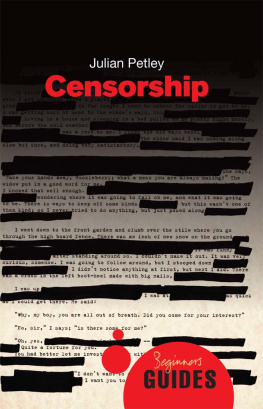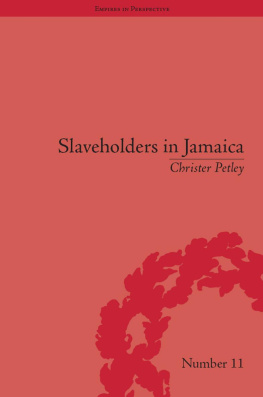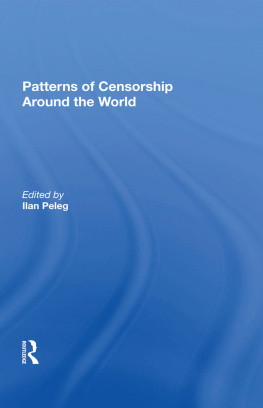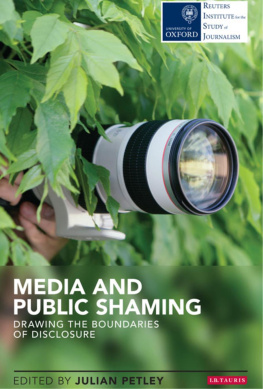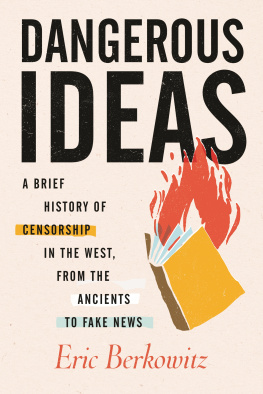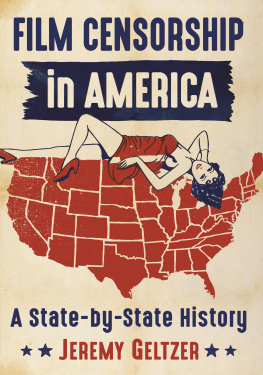Censorship
A Beginners Guide
ONEWORLD BEGINNERS GUIDES combine an original, inventive, and engaging approach with expert analysis on subjects ranging from art and history to religion and politics, and everything in between. Innovative and affordable, books in the series are perfect for anyone curious about the way the world works and the big ideas of our time.
anarchism
artificial intelligence
the beat generation
biodiversity
bioterror & biowarfare
the brain
the buddha
censorship
christianity
civil liberties
classical music
cloning
cold war
crimes against humanity
criminal psychology
critical thinking
daoism
democracy
dyslexia
energy
engineering
evolution
evolutionary psychology
existentialism
fair trade
feminism
forensic science
french revolution
history of science
humanism
islamic philosophy
journalism
lacan
life in the universe
machiavelli
mafia & organized crime
marx
medieval philosophy
middle east
NATO
oil
the palestineisraeli conflict
philosophy of mind
philosophy of religion
philosophy of science
postmodernism
psychology
quantum physics
the quran
racism
the small arms trade
sufism


A Oneworld Paperback Original
Published by Oneworld Publications 2009
Copyright Julian Petley 2009
This ebook edition published by Oneworld Publications 2012
The right of Julian Petley to be identified as the Author of this work has been asserted by him in accordance with the Copyright, Designs and Patents Act 1988
All rights reserved
Copyright under Berne Convention
A CIP record for this title is available from the British Library
ISBN 9781851686742
ebook ISBN 9781780741383
Typeset by Jayvee, Trivandrum, India
Cover design by www.fatfacedesign.com
Oneworld Publications
185 Banbury Road
Oxford OX2 7AR
England
www.oneworld-publications.com
Learn more about Oneworld. Join our mailing list to find out about our latest titles and special offers at:
www.oneworld-publications.com
Truth and understanding are not such wares as to be monopolised and traded in by tickets and statutes and standards. We must not think how to make a staple commodity of all the knowledge in the land, to mark it and license it like our broadcloth and our woolpacks.
John Milton, 1644.
Who would overthrow the liberty of a nation must begin by subduing the freedom of speech.
Benjamin Franklin, 1722.
If liberty means anything at all, it means the right to tell people what they dont want to hear.
George Orwell, 1945.
Freedom of expression constitutes one of the essential foundations of a democratic society and one of the basic conditions for its progress and for each individuals self-fulfilment. It is applicable not only to information or ideas that are favourably received or regarded as inoffensive or as a matter of indifference, but also to those that offend, shock or disturb. Such are the demands of pluralism, tolerance and broad-mindedness without which there is no democratic society.
European Court of Human Rights, 1976.
For Mary
Introduction
Think of censorship, and you may well conjure up the image of some grey bureaucrat in a dusty office snipping at away at a roll of film, or laboriously crossing out words and lines on a printed page. You may also imagine this scene playing out in the past in Nazi Germany or Stalins USSR perhaps or in one of todays authoritarian societies such as Burma or Saudi Arabia. And indeed this book is partly about censorship in the past, and does partly concern itself with censorship in undemocratic regimes. But it is also very much about the present, about the censorship of the latest forms of communication, and about how censorship exists in democracies too. For even in such societies, freedom of expression is never absolute.
In a book of this length, indeed of any length, it would clearly be impossible to give a complete history of censorship in all its forms across the globe and throughout history. Those in search of such an account are advised to turn to Derek Joness monumental, four-volume Censorship: a World Encyclopedia, and this book will explore the operations of forms of censorship from this broad perspective.
The book is organised so that it proceeds from an examination of the most direct forms of censorship to those which operate in more indirect and covert ways. We thus start with the murder and intimidation of journalists, an ever-growing phenomenon and one which is causing growing concern across the world. In war zones, journalists are increasingly excluded unless they choose to be embedded, and those who do manage to report unofficially or independently are increasingly regarded as legitimate targets. In authoritarian countries, journalists who offend against powerful political, corporate or criminal interests are attacked with impunity Russia furnishing a particularly acute example of this tendency and even in democratic countries such as the UK, police harassment of journalists covering demonstrations has reached such a pitch that it has been the subject of protests by the National Union of Journalists and debate within the European Parliament. The consequence, and indeed the purpose, of all such forms of intimidation is to prevent or at least discourage the journalistic investigation of certain topics. This is the most direct and dramatic form of censorship at work in the world today, and it is on the increase.
The destruction of works of art and literature performs a similar function. Not only does it constitute a highly symbolic attack on the values and belief systems represented by the works in question, but it also sends out a powerfully intimidatory message to the creators and owners of such works. As the German poet Heinrich Heine so presciently warned in 1823: Wherever they burn books, they will end up burning people, an admonition all too clearly borne out by the Holocaust but which also finds an echo in the events surrounding The Satanic Verses, the Danish cartoons and The Jewel of Medina. (These are explored both in chapter 1 and the Conclusion.)
A less dramatic, but still effective, form of censorship is to draw up lists of banned works and to forbid people both from publishing and accessing them. This form of censorship is discussed in chapter 2. The most famous of these lists was the Index Librorum Prohibitorum of the Roman Catholic Church. This was finally abandoned in 1966, but it is not exactly difficult to find examples of indexes in the modern world for example the lists of IPs and URLs which help to constitute the Great Firewall of China, the blacklist operated in Britain by the Internet Watch Foundation (both discussed in chapter 5), or the list of video nasties drawn up by the Director of Public Prosecutions in Britain in the early 1980s (chapter 4).
Of course, the most effective form of censorship consists in preventing contentious material from ever being produced in the first place. This is a particular specialism of authoritarian societies, where the absence of democratic structures makes such a degree of control possible. For example, in the Third Reich, everybody who worked in the cultural and communications fields had if they wished to work at all to belong to the appropriate chamber of the Reich Chamber of Culture, which in turn was attached to the Ministry of Propaganda, and to abide strictly by its numerous rules. Thus, at a stroke, it was possible to exclude Jews, Socialists, Communists and everyone else deemed undesirable from the realms of the arts, culture and the media, and to ensure that those remaining obeyed the rules, of which there were many. Hence, except in the first two years of the regime, there was, paradoxically, relatively little censorship (in the sense of cuts and bans of completed works) in one of the most authoritarian regimes of the twentieth century. However, this aspect of Nazi
Next page
